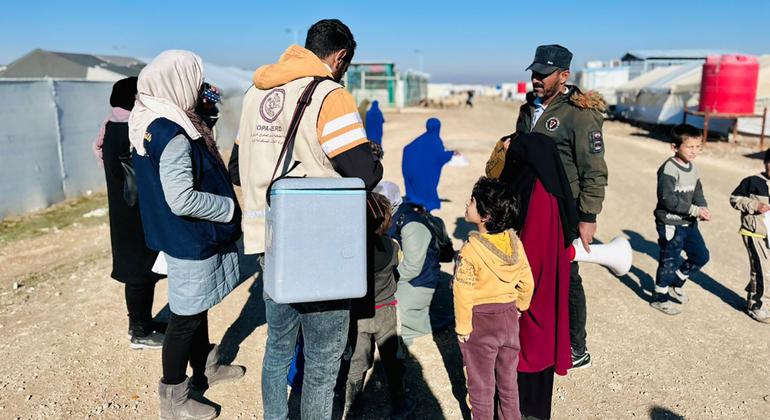The cholera outbreak in the Al Hol camp in Syria has been a cause for concern since early October when it was first detected and subsequently confirmed by laboratory tests. The lack of a specialist treatment center for acute watery diarrhoea in the camp has made it crucial for as many people as possible to be vaccinated quickly, according to the UN Children’s Fund, UNICEF.
In a recent development, UNICEF has managed to bring the cholera vaccine from northwest Syria to the northeast to vaccinate people in Al Hol camp. Despite the challenging security situation in the country, UNICEF health and nutrition officer Khourchid Hasan expressed gratitude for the cooperation of the caretaker authority in Damascus and the local authorities in Syria’s northeast, who facilitated the delivery of vaccines to the gates of Al Hol, which is controlled by the Kurdish-backed Syrian Democratic Forces (SDF).
Mr. Hasan emphasized the importance of continuing the vaccine rollout in Al Hol, even in the face of threats published on social media last December regarding potential attacks on the camp by ISIL. Despite the temporary closure of access to the camp for three days, Mr. Hasan confirmed that operations have resumed and that the vaccination campaign is ongoing. So far, at least 14,000 people in the camp have received a cholera vaccination, with vaccination teams working tirelessly to reach more individuals, including children and their caregivers.
The teams of vaccinators navigate the camp’s tented shelters on foot, using loudhailers to encourage families to come forward and receive their doses. The vaccine, once administered, provides protection against cholera, a potentially deadly disease that requires immediate treatment. Mr. Hasan highlighted the successful transportation of 25,000 doses of vaccine from northwest Syria across former active battle lines, allowing the vaccination campaign to proceed. He also commended the efforts of UNICEF’s social behavior change and risk communication colleagues and partners, who engaged with community networks to promote the oral cholera vaccine campaign and build trust among the population of Al Hol.
Al Hol has been a site of turmoil for years, housing the wives and children of ISIL fighters, displaced individuals, and refugees impacted by the Syrian war. Conditions within the camp have been described as dire, drawing attention from human rights experts reporting to the Human Rights Council on the urgent need for improved living conditions.
The majority of those held in the camp by the SDF are Syrian and Iraqi nationals, while foreign nationals who traveled to Syria to join ISIL fighters or were coerced into doing so are confined to a separate annexe within the camp. Divided into five zones, the camp faces numerous challenges in providing adequate care and support for its inhabitants, especially in light of the ongoing conflict and instability in the region.
Despite these challenges, UNICEF remains committed to ensuring the health and well-being of the population in Al Hol through vaccination campaigns and other lifesaving interventions. The organization’s dedication to reaching vulnerable communities in even the most challenging circumstances demonstrates the importance of humanitarian efforts in providing relief and support to those in need. As the situation in Al Hol continues to evolve, the collaborative efforts of UNICEF and its partners will be essential in addressing the ongoing health concerns and improving conditions within the camp.









